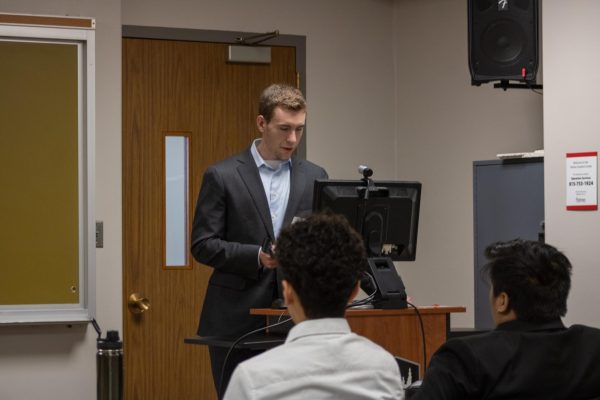University opens door to August graduates
March 3, 2005
August graduates are allowed to walk at the May graduation ceremonies.
“Get to your colleges, get to your departments – we are trying to accommodate the individual student,” Vice Provost Earl Seaver said. “The school is being proactive in getting students into the May ceremony.”
“All of us are concerned about this, each of us knows how really important this is and wants to support students who want to come in May,” said Sue Doederlein, associate dean of the College of Liberal Arts and Sciences. “We are certainly wanting to support August students attending in May, but we can’t guarantee a blanket approval because of logistic reasons.”
For these reasons, Doederlein encourages all students to apply early for the May ceremonies.
“Logistics and ticket distribution are the issues,” Doederlein said. “We want to be sure that any student who is approved for attendance gets a cap and gown at the pick-up date and the maximum 10 tickets for distribution in April.”
“We are not going to shut anybody out because of a deadline,” Seaver said. “We will work with the records and registration office on that.”
Seaver said he saw the letters to the editors printed in the Northern Star.
“I think where we are at now is we are moving forward,” Seaver said. “We are asking students to work with their colleges and departments to see if it is possible to walk in the May ceremonies.”
Students’ involvement
“No, students did not participate in any of the meetings,” Seaver said. “There were a whole number of factors we tried to discuss. It is very complex.”
Provosts, deans and staff were consulted, Seaver said.
“We did not take a campus-wide poll,” Seaver said. “We looked at cost, attendance, attendance patterns over time, faculty participation, staff that is involved, student participation, what other universities do, the history of having summer commencement, suggestions in the past from faculty and staff.”
Seaver said student leadership did seek him out for discussion after the decision was made, but Seaver declined to name whom he talked to.
“We did meet after the decision was made. They sought me out and we talked about ways to make it work for students who could not get to the summer graduation,” Seaver said. “I asked them what kind of things we can do to help with the transition.”
Student Association President Craig Marcus said he has heard numerous complaints about the cancellation of the summer graduation ceremonies.
“It is an unfortunate circumstance,” Marcus said.
But Marcus said he was not contacted by Seaver or NIU administration.
“Nobody came to me personally,” Marcus said. “The administration is usually very good about discussing these things with the SA. It happens to be an issue they did not inform us about. This may have been something that the administration talked to previous SA presidents about; I don’t know.”
Faculty input
Some faculty are upset about the cancellation of the August ceremonies as well.
“I have heard some muttering that a little more advance notice would have been welcome,” said Sue Willis, acting associate dean of the graduate school. “Faculty are less enthralled, particularly at the timing of it.”
Just how much input the faculty and deans had is unclear.
“By the time I got involved, a day or two before they announced it, it was pretty much a done deal,” Willis said. “I did express some reservations about it, though.”
Graduation ceremony costs
Total commencement expenses were about $261,000 for fiscal 2004 and the cost is not broken down by ceremony, said Don Larson, executive director and registrar of enrollment services.
The $261,000 includes the cost for renting the Convocation Center, security, ushers, parking, bands, program printing and printing of the graduates list, Larson said.
The $29 graduation fee students pay typically covers the costs for diplomas, diploma covers, cap and gown and mailing the diplomas, Larson said.
“I don’t believe the fee is enough to cover the cost of the commencement,” Larson said. “The university covers the rest of the cost.”
Canceling the August ceremonies might not save the university any money.
“The largest single expenses years ago were caps and gowns, mailing diplomas and printing programs,” Larson said. “If students go to a different ceremony, those expenses will still be there.”
International student dilemma
Some international students also may be affected by the August ceremony cancellation.
Once international students complete their graduation requirements, they have 60 days to leave the country if they are not approved for optional practical training or a visa status change, said Thecla Cooler, director of the international student and faculty office.
“Graduation is a ceremony, so they couldn’t just wait,” Cooler said. “On the other hand, most students do request and receive optional practical training.”
International students can apply through the U.S. Homeland Security Office for “optional practical training,” which allows them to stay in the country for an additional 12 months post graduation.













